School responses to behaviour are not working
As part of an inquiry into behaviour and mental health in schools, the Children and Young People's Mental Health Coalition, of which Thrive is a member, asked young people, parents and professionals their views on current approaches to behaviour management and mental health in schools, and how they can be improved, via an open call for evidence. The survey heard from 111 young people, 495 parents and 234 professionals. Respondents strongly agreed that behaviour is linked to young people’s mental health, but that current responses to behaviour in school do not reflect this and are not working.
79% of young people agree that behaviour is linked to their mental health
79% of young people who responded to the call for evidence and 87% of parents and carers agreed that a young person’s behaviour is linked to their mental health. However, only 21% of young people and 7% of parents felt that schools are responsive to young people’s mental health needs when dealing with behavioural issues.
Professionals responding to the survey had more mixed views. This included teachers, headteachers, mental health practitioners and representatives from the Voluntary and Community Sector. While 32% of professionals responding said that schools are responsive to young people’s mental health needs when dealing with behavioural issues, 46% disagreed.
When asked about the effectiveness of behaviour management techniques used in schools, over half of young people (59%) who responded said they were not effective in improving behaviour. 80% of parents and carers and 56% of professionals also stated that behaviour management techniques used by schools are not effective.
.jpg)
Widespread concern about punitive approaches
The inquiry is exploring the links between mental health and behaviour, how current school policies on behaviour affect young people and their families, and what schools can do to improve both behaviour and mental health.
This follows widespread concern about the increased use of punitive approaches such as the use of exclusion and removal rooms to improve behaviour in schools. The rise in the use of punitive approaches is set against a backdrop of growing mental health need among children and young people, with one in six children and young people aged 6 to 16 experiencing a mental health problem in 2021 compared to one in nine in 2017.
The survey is the first stage of the behaviour and mental health in schools’ inquiry, with further evidence gathering planned. The Children and Young People’s Mental Health Coalition will report on the full findings early next year.
An ambition to create supportive, safe and inclusive school environments
Sir Norman Lamb, Chair of the Children and Young People’s Mental Health Coalition, said:
“We must not forget that children and young people’s mental health and wellbeing is more important than ever. Our preliminary findings suggest that whilst young people are aware that behaviour is often linked to their mental health, they do not believe that current behaviour policies are effective."
"We share the ambition of government to create supportive, safe and inclusive school environments that enable and facilitate learning. The call for evidence has captured wide-ranging views on the topic of behaviour and mental health in schools, and we are keen to understand all viewpoints throughout the inquiry. We want to inform government policies and school practices that boost children’s mental health and behaviour for everyone’s benefit.”
.jpg)
Over to you
Thrive is a proud member of the Children and Young People's Mental Health Coalition which brings together over 260 charities, academic institutions and professional bodies to campaign for the better mental health of babies, children and young people. To find out more about how Thrive supports wellbeing to transform behaviour in your school, book a Discovery Call with your regional expert. Designed to fit in around your schedule, these free 30-minute conversations via Teams give you a chance to have your questions answered, decide whether Thrive is a fit, and identify if you qualify for a £1,200 DfE grant to spend in your setting.
Pass it on
Small actions can lead to a big ripple effect. If you enjoyed this post or found it helpful, please consider supporting us in our mission to help every child and young person feel safe, supported and ready to learn by sharing it using the social media buttons below.
Want to join a like-minded community of senior leaders and classroom staff benefitting from insights and strategies to improve attendance, behaviour and attainment? Add your email address below. (It’s easy to unsubscribe).

_680.jpg)

_680.jpg)


(1)_680.jpg)